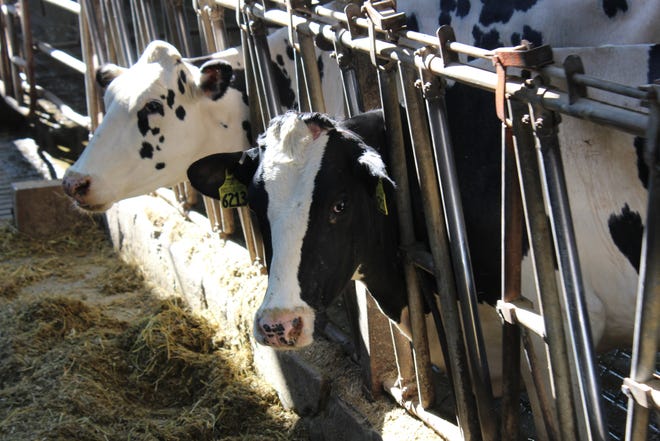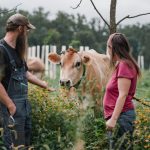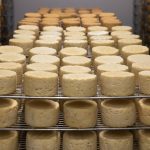
Plus, the U.S. dairy supply chain—from the farm to the consumer—continues to strengthen its world-leading approach to sustainability that prioritizes innovation, technology and efficiency and will keep U.S. dairy central to the future of the global food system.
From 2007-2017, the environmental impact of producing a gallon of milk in the United States shrank significantly, requiring 30% less water and 21% less land. Those reductions resulted in a 19% smaller carbon footprint. But the industry is not resting on those achievements. Instead, it forged ahead this year with the 2050 Environmental Stewardship Goals and the Net Zero Initiative.
“It is important that the rest of the world understand that U.S. Dairy cares about feeding people, cares about rural communities and cares about the planet,” says Krysta Harden, chief operating officer for the U.S. Dairy Export Council (USDEC). “Collectively passing new and aggressive sustainability goals is just one way U.S. Dairy can prove we are a global leader in this area.”
U.S. dairy farmers and suppliers know this. But dairy opponents and our competitors have sought to paint a different picture.
UN food summit challenge
That’s one reason the U.S. Dairy Export Council (USDEC) last month partnered with the Inter-American Institute for Cooperation on Agriculture (IICA) to host the virtual symposium, “The Importance of Livestock Production and Animal Protein: The Western Hemisphere Perspective.”
The symposium—to promote and defend the essential role of dairy in the global food system, support science-based policymaking and highlight the benefits of international trade in economic development—is part of a broader effort to prepare for the UN Food Systems Summit in September 2021.
The summit is being held to help “raise global awareness, deepen our understanding of the problems we must solve and set a course to radically change the way we produce, process and consume food,” said Agnes Kalibata, the UN Special Envoy to the summit.
The conference aims to establish a global policy framework to make food systems more sustainable, equitable and nutritious. In doing so, it will shape agriculture policies around the world, impacting the regulatory and business environment in which U.S. dairy exports are produced, marketed and consumed for years to come.
Threats and opportunities
Any effort to “radically change” food systems brings with it threats and opportunities for U.S. dairy. The UN Food Systems Summit will serve as an opportunity to reinforce the essential role of dairy as a source of affordable, sustainable nutrition. But it carries a threat that dairy and other animal-sourced foods will lose out to a plant-only agenda driven by certain European-based institutions and activists.
The USDEC-IICA webinar offered a Western Hemisphere perspective on the importance of livestock production and animal protein consumption with science at its core. Too often current debates about food policy are being driven by advocates opposed to animal agriculture or who discourage the use of safe, innovative technologies. This is most evident in Europe and fueled by EU policies and organizations like the EAT Foundation that advocate for a plant-based or plant-only diet.
Unfortunately, those groups are heavily involved in the planning and execution of the Food Systems Summit. This makes it essential that dairy is proactive and engaged to protect important U.S. dairy export markets that frequently implement recommendations from the UN.
Unified front
Livestock producers throughout the Western Hemisphere, united via IICA and energized by programming like the USDEC-organized symposium, will help build a united front, to demand that the summit recommend only sound scientific policies, recognize the important role of livestock in the food system, and avoid ideological or regional interests.
USDEC continues to proactively leverage its global partnerships, like that with IICA, to position U.S. dairy as part of the solution for feeding the world responsibly and sustainably.
U.S. dairy featured prominently in the recent IICA symposium’s programming, which covered nearly all livestock sectors in the Americas.
More to come to prepare for UN summit
Those dairy-specific presentations will be included in a forthcoming publication of the proceedings of the symposium. The publication is part of a broader USDEC effort to generate a strong evidence base documenting the role of dairy in food systems that will inform preparations for next year’s UN summit.
USDEC will also leverage the publication with international organizations like Codex, the World Health Organization, the UN Food & Agriculture Organization and the World Organization for Animal Health that are increasingly developing food system-based policies and recommendations.
IICA and its Western Hemisphere network will be essential to amplify dairy and other livestock priorities leading up to the summit with USDEC uniquely positioned to promote U.S. dairy’s positive sustainability, nutrition and animal-care story globally. Only then can U.S. Dairy maximize the potential benefits to global dairy consumption and trade that the UN Food Systems Summit offers while minimizing the risks to dairy production and animal-protein consumption presented by some of the summit’s most ideologically driven supporters.
Nick Gardner is vice president, Codex and International Regulatory Affairs, at the U.S. Dairy Export Council.























